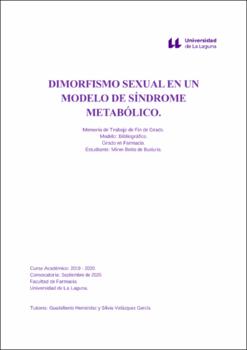Dimorfismo sexual en un modelo de síndrome metabólico
Author
Beitia de Busturia, MirenDate
2020Abstract
The Metabolic Syndrome (MetS) is a group of disorders constituted by obesity of central
distribution, dyslipidemia, increase in blood pressure, hyperglycemia and insulin resistance.
Since lifestyle and genes are key in its development, in order to avoid MetS it is
recommended to combine a healthy lifestyle through a correct diet and aerobic exercise. The
serum and glucocorticoid-inducible kinase 1 (SGK1) would be involved in MetS
development. This kinase expression is regulated by hormones such as gluco- and mineralocorticoids and, at the transcriptional level, by osmotic and glucose changes. Previous data
published by my supervisors have shown as SGK1 overexpression in a model of laboratory
mice (B6.Tg.sgk1) is able to reproduce MetS. As there are differences in age and prevalence
between sexes in humans, it suggests that sexual hormones may play an important role in
MetS causes and/or development, the aims of this project are A) to review the state of the art
something to do with the implications of sexual hormones in MetS, B) to elaborate an
experimental design in order to research if sexual hormones are able to modify some wellknown parameters related to MetS. To this purpose, we propose to study in two strains of
adult laboratory mice (Wild type, WT, and transgenic one overactivated for SGK1,
B6.Tg.sgk1) which will be grouped by sexes and fed under a high and low fat diet,
respectively, and treated with three different dosage of EMD63863 (inhibitor of SGK1
activity). In order to expanding the level of knowledges on sexual hormones and MetS, we
propose a similar pattern design using human as experimental subjects.





